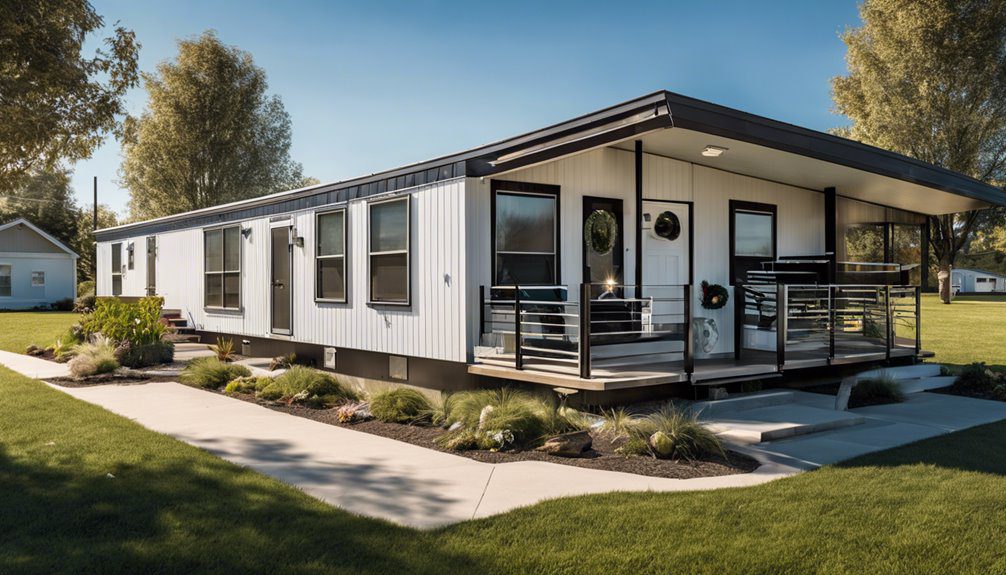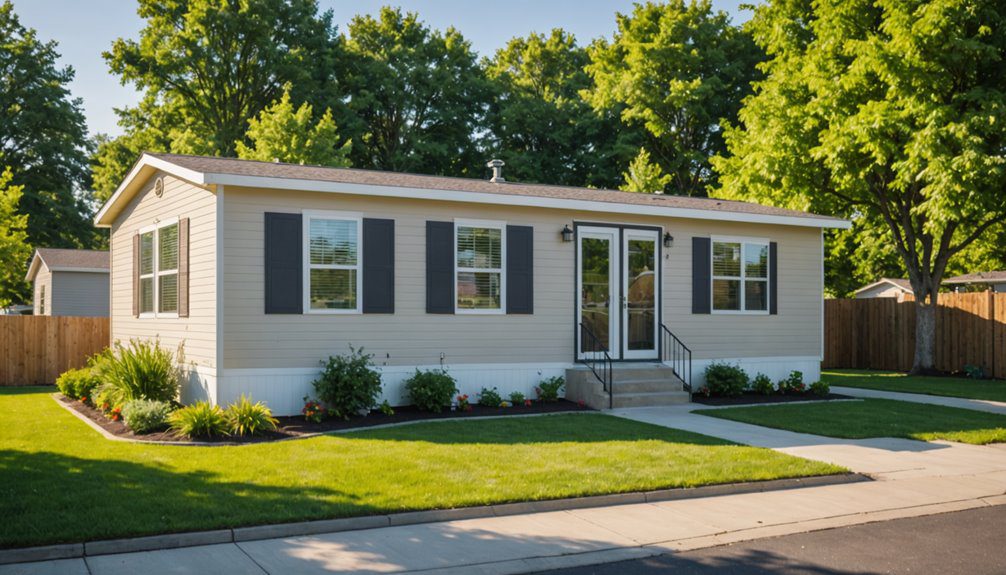If you're involved in the manufactured housing sector in South Carolina, understanding the $5,000 bond requirement is essential for your business. This bond not only protects consumers but also enhances your credibility as a contractor. You might wonder how this impacts your ability to secure contracts or what the application process looks like. Exploring these aspects can reveal significant advantages for your business, yet many contractors overlook crucial details that could affect their standing. What happens if you don't comply, and how can you ensure you're fully prepared?
Understanding the ,000 Bond

When you're navigating the world of manufactured home contracting, understanding the $5,000 bond is crucial. This bond acts as a financial safeguard, ensuring that you, as a contractor, adhere to state laws and regulations.
It's a requirement in many places, designed to protect consumers from potential financial loss due to contractor misconduct or failure to meet contractual obligations.
You'll need to secure this bond before you can begin work on manufactured homes. The process typically involves submitting an application and paying a premium, which is a percentage of the total bond amount. Your credit score and financial history can influence the premium you pay.
Once you're bonded, the bond guarantees that if you fail to meet your obligations, a claim can be filed against it to recover damages. This means you've got a vested interest in maintaining a good reputation; your bond is your promise to operate ethically and responsibly. Additionally, home dealer bonds provide financial recourse for homeowners against losses, enhancing trust in your business practices.
Understanding this bond can't only help you stay compliant with legal requirements but also enhance your credibility in the industry.
Importance of the Bond
The bond plays a vital role in your contracting business, serving as a guarantee to clients that you'll uphold your contractual obligations and adhere to state regulations. This assurance builds trust with your customers, making them more likely to choose your services over competitors.
When clients know you have a bond, they feel more secure in their investment, knowing they've a safety net if things don't go as planned.
Moreover, having the bond can enhance your professional reputation. It signals that you're committed to ethical business practices and that you take your responsibilities seriously.
In case of any disputes or claims, the bond provides financial protection for your clients, ensuring that they can recover losses if you fail to meet your obligations.
Additionally, many clients require contractors to have a bond before they'll even consider hiring you. It can be a decisive factor in securing contracts and expanding your business.
Ultimately, the bond isn't just a legal requirement; it's a strategic asset that can significantly impact your success in the manufactured home contracting industry. Arkansas Surety Bonds not only protect consumers and the state from potential losses but also enhance your credibility in the market.
Investing in this bond is investing in your future and credibility.
Who Needs the Bond?

Who needs a manufactured home contractor bond? If you're a contractor in South Carolina who specializes in the installation, repair, or renovation of manufactured homes, you're required to obtain this bond. This bond serves as a financial guarantee that you'll comply with state regulations and fulfill your contractual obligations.
Additionally, if you're a business owner operating in the manufactured housing industry, you'll likely need the bond to protect your clients from potential losses caused by your actions or failures to meet standards. Homebuyers often look for contractors who are bonded, as it provides them with an extra layer of security.
You'll also want to consider the bond if you're planning to bid on government contracts or work with financial institutions, as they often require proof of bonding before awarding projects.
Even if you're a subcontractor in this field, obtaining a bond can enhance your credibility and show potential clients that you're committed to professionalism. Moreover, having this bond can provide financial security for project completion, which is crucial in the construction industry.
In short, if you're involved in the manufactured home sector in South Carolina, you'll need this bond to operate legally and build trust with your clients.
Bond Application Process
Obtaining a manufactured home contractor bond involves a straightforward application process that ensures you meet all necessary requirements.
First, you'll need to gather essential documents, such as your business license, insurance information, and financial statements. These documents help verify your legitimacy and financial stability as a contractor.
Next, you'll complete the bond application form, which typically requires basic information about your business, including your name, address, and contact details. Be thorough and accurate, as any discrepancies can delay the process.
After submitting the application, you may be asked for additional information or clarification, so it's important to respond promptly.
Once your application is reviewed, the surety company will assess your financial history and creditworthiness. This evaluation helps determine the bond premium you'll need to pay. Additionally, ensure you understand the cost structures associated with the bond, as they may vary based on your jurisdiction.
If everything checks out, you'll receive your bond, often within a few days.
Requirements for Contractors

To operate as a manufactured home contractor, you'll need to meet several essential requirements that ensure compliance with state regulations.
First, you must obtain a valid contractor's license specific to manufactured homes. This typically involves passing an exam that tests your knowledge of construction standards, safety regulations, and local building codes.
Next, you'll need to provide proof of liability insurance. This insurance protects you and your clients from potential damages or accidents during the construction process. Make sure to keep your coverage adequate to reflect the scope of your work.
Additionally, you must secure a $5,000 surety bond. This bond acts as a financial guarantee that you'll adhere to state laws and regulations, offering protection to your clients in case of any misconduct or failure to meet obligations. This bond also serves as a means of ensuring regulatory compliance with state and federal requirements.
Lastly, you should familiarize yourself with local zoning laws and building permits required for manufactured home installations. Complying with these regulations can save you from potential fines or delays.
Bond Coverage and Limits
When it comes to bond coverage and limits for manufactured home contractors, understanding the specifics is crucial. The $5,000 bond requirement ensures that you're financially responsible and can cover potential damages or claims against you. This bond acts as a safety net, protecting consumers from any unethical practices or negligence in your work.
It's important to note that the bond amount isn't a license to operate without diligence. If claims exceed the bond limit, you're personally liable for the remaining costs. So, while the $5,000 bond provides a layer of assurance for your clients, it also emphasizes the importance of maintaining high standards in your business practices.
Bond coverage typically includes various aspects of your work, like failure to meet contractual obligations or licensure issues. However, it won't cover intentional misconduct or illegal activities. Additionally, understanding local regulations is essential for ensuring compliance and successful bond acquisition.
You'll need to familiarize yourself with what's included in the bond coverage to avoid any surprises.
How to File a Claim

Filing a claim against your manufactured home contractor bond is a straightforward process, but it's essential to understand the steps involved to ensure everything goes smoothly.
First, gather all relevant documentation, including your contract, invoices, and any correspondence with the contractor. This evidence will support your claim.
Next, contact the surety company that issued the bond. They'll provide you with the specific claim form you need to fill out. Make sure you complete the form accurately, detailing the nature of your claim and the amount you're seeking. Be clear and concise in your explanations.
Once you've filled out the claim form, submit it along with your supporting documents to the surety company. Keep copies for your records.
The bond provider will review your claim and investigate the situation, which may involve contacting the contractor for their response.
Common Misconceptions
Many people have misconceptions about manufactured home contractor bonds that can lead to confusion and frustration.
One common myth is that these bonds provide direct protection to homeowners. In reality, the bond acts as a financial guarantee that the contractor will comply with state regulations and fulfill contractual obligations. If they fail to do so, the bond can cover damages, but it's not a direct insurance policy for the homeowner.
Another misconception is that all contractors are required to obtain the same amount of bonding. Bond amounts vary based on specific state requirements and the contractor's experience, so it's crucial to verify the exact amount needed for your situation.
Additionally, some folks believe that once a bond is obtained, it's a one-time deal. Bonds often require periodic renewal and continuous compliance with regulations, which can lead to penalties if not maintained. It is important to understand that surety bonds are essential for maintaining regulatory standards within various industries.
Renewal and Maintenance

Understanding the nuances of manufactured home contractor bonds doesn't stop at obtaining one; renewal and maintenance are key components that contractors must manage.
To keep your bond active, you'll need to renew it periodically, typically on an annual basis. This process involves paying a renewal premium, which can vary based on your credit history and the surety company's policies.
You should check your bond's expiration date and start the renewal process well in advance. This way, you won't face any lapses that could jeopardize your contracting business.
Maintaining good standing with your surety is crucial, so stay informed about any changes in regulations or requirements that could affect your bond.
Make sure you're compliant with all local laws regarding manufactured home contracting, as violations can impact your bond's status.
It's also wise to keep track of your claims history. A clean record enhances your credibility and can lead to lower renewal premiums in the future. Additionally, understanding the financial implications of your bond is essential, as it serves as protection for the public against malpractice.
Resources for Contractors
As a manufactured home contractor, tapping into a variety of resources can significantly enhance your business operations and compliance efforts. One of the first places you should look is your local and state regulatory agencies. They provide essential guidelines and updates on laws affecting your industry.
Joining professional associations, like the Manufactured Housing Institute, can also offer valuable networking opportunities and access to industry-specific information.
Consider utilizing online platforms and forums where you can connect with other contractors, share experiences, and discuss challenges. These communities often provide insights into best practices that can save you time and money.
Additionally, investing in training and certification programs can further boost your expertise and credibility. It is also beneficial to understand the regulatory framework governing surety bonds, as it can aid in ensuring compliance with legal requirements.
Don't overlook the importance of financial resources, such as loans or grants specifically designed for contractors in the manufactured housing sector. Researching these options can help you manage cash flow effectively.
Finally, maintaining a solid relationship with suppliers ensures you get quality materials on time, which is crucial for project success.
Conclusion
In summary, the South Carolina Manufactured Home Contractor $5,000 Bond is essential for ensuring compliance and protecting consumers. By securing this bond, you not only enhance your credibility but also increase your competitiveness in the industry. Understanding the requirements and maintaining your bond can lead to smoother operations and trust from your clients. Don't overlook the benefits of this bond—it's a vital step in building a successful contracting business in manufactured housing.


